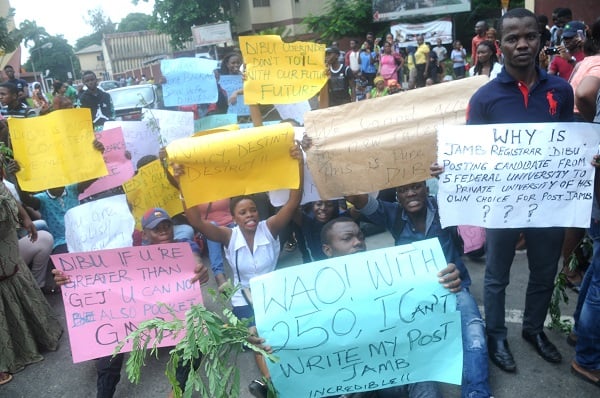Admission into tertiary institutions in Nigeria is becoming more tasking, frustrating and equally very competitive by the year and it takes only those candidates with the right information and mindset to get past the struggle.
With the ever increasing number of candidates registering for JAMB every year and the limited admission spaces available, it’s imperative to worry and be more concerned about your admission dream for next year’s admission process.
However, some candidates don’t have the right information about how the admission process works so they tend to blame numerous number of factors, but I will give five important reasons why students don’t get admission.
Low UTME scores for important courses
Many candidates, who scored below 200 in the UTME, are always applying for courses which are “way out of their league”.
A candidate who scored 198 and has decided to study medicine at the Ahmadu Bello University (ABU), can never be admitted into the university.
The reason is simple; universities have “hidden”/certain requirements for various courses, and these requirements are not popular among most candidates (except the “experienced” ones).
Most universities want candidates with 240 and above for important courses such as medicine. But due to the inefficieny of JAMB, they may opt to accept students with lower UTME marks, coupled with their own post-UTME screening before admitting candidates.
My advice is, if you’ve scored a lower mark, change your course, so you can have a little advantage before writing the post-UTME.
Poor knowledge of schools
In addition to the first point, candidates have little knowledge about their chosen institutions.
Many candidates don’t know how many students have chosen their selected schools, many don’t know the capacity of their selected schools and many don’t know the how good their schools are in terms of teaching and infrastructure.
All these affects their chances of getting admitted.
Parental influence
Most parents want to select the schools and courses for their children, without knowing their childrens’ abilities, which is unfair.
Some parents are not knowledgeable on the happenings in the educational sector, but they still want to be the ones to choose.
Some parents rely/wait for their friends’ advice, before making a decision.
This is a major cause of headache for some candidates, whether or not they enter the university.
Tribalism, catchment areas & location of school
As we all know, universities in south-western geographical region of Nigeria, will admit predominantly Yoruba candidates. Same goes for the north, south-south and eastern region of Nigeria.
This a major headache for all candidates and it should be a problem for the presidency, since it doesn’t promote intergration in the country.
Candidates should choose schools thats to their advantage, geographically e.g. UniAbuja, UniIbadan, UniPort, FUNAAB e.t.c.
Poor selection of schools
There are 127 degree awarding institutions in Nigeria, of which 68 are state and federal universities. And also, there are over 40 private universities in Nigeria.
Here’s the break-down: 25 federal universities; 3 universities of Agriculture; 6 universities of Technology; 29 state universities; 5 state universities of Technology; 59 other degree awarding institutions.
But candidates won’t select universities which are more suitable for their course (e.g. FUTA, FUTO, FUPRE, OSUSTECH are universities of technology but many would select any of them blindly without doing a little research).
Candidates should endeavour to have the right information about the school and also the course they are applying for.
If you can do all these, leave the rest for God.
Abasiama Udoeden is a student of Akwa Ibom state university
Copyright 2025 TheCable. All rights reserved. This material, and other digital content on this website, may not be reproduced, published, broadcast, rewritten or redistributed in whole or in part without prior express written permission from TheCable.
Follow us on twitter @Thecablestyle

